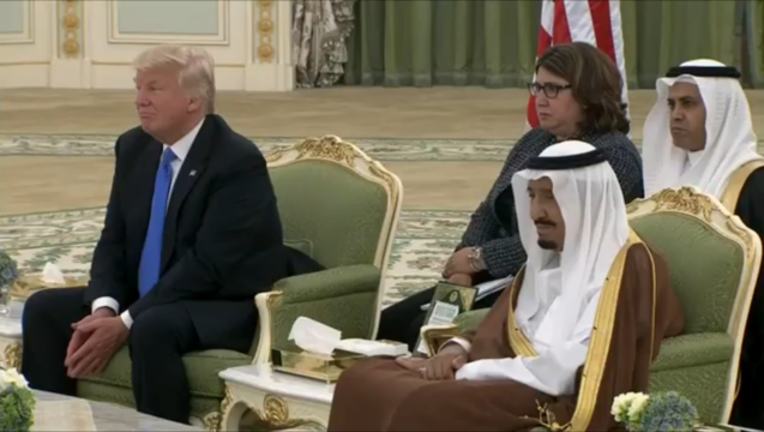President Trump opens first presidential trip abroad in Saudi Arabia

RIYADH, Saudi Arabia (AP) - President Donald Trump, in the first stop of his maiden trip abroad, received a regal welcome Saturday in Saudi Arabia, feted by the wealthy kingdom as he aims to forge strong alliances to combat terrorism while pushing past the multiple controversies threatening to engulf his young administration.
Trump arrived in Riyadh after an overnight flight and was welcomed at elaborate airport ceremony punctuated by a military flyover and a handshake from Saudi King Salman. He is the only American president to make Saudi Arabia, or any majority Muslim country, his first stop overseas - a choice designed in part to show respect to the region after more than a year of Trump's harsh anti-Muslim campaign rhetoric.
The visit kicks off an ambitious international debut for Trump. After two days of meetings here, Trump will travel to Israel, have an audience with Pope Francis at the Vatican and meet with allies at a NATO summit in Brussels and the Group of 7 powerful nations in Sicily.
Trump waved from the doorway after Air Force One touched down and before descending the staircase with first lady Melania Trump. The 81-year-old King Salman, who used a cane for support, was brought to the steps of the plane in a golf cart. The leaders exchanged pleasantries and Trump said it was "a great honor" to be there.
Several jets then flew overhead leaving a red, white and blue trail.
Soon after, Trump tweeted for the first time on international soil as president. "Great to be in Riyadh, Saudi Arabia. Looking forward to the afternoon and evening ahead."
At a later ceremony at the grand Saudi Royal Court, the king placed the Collar of Abdulaziz Al Saud, the nation's highest civilian honor, around Trump's neck. The medal, given to Trump for his efforts to strengthen ties in the region, has also been bestowed on Russian President Vladimir Putin, British Prime Minister Theresa May and Trump's predecessor, Barack Obama.
The king and Trump were overheard discussing natural resources and arms, and the king bemoaned the destruction caused by Syria's civil war. Trump also was set to sign a defense cooperation agreement with the Saudis, pledging $110 billion effective immediately and up to $350 billion over 10 years, as well as some private sector agreements. The military package includes tanks, combat ships, missile defense systems, radar and communications, and cybersecurity technology.
White House officials hope the trip, complete with images of the accompanying pomp and pageantry of a president abroad, will help Trump recalibrate after one of the most difficult stretches of his young presidency. The White House bungled the president's stunning firing of FBI Director James Comey, who was overseeing a federal investigation into possible ties between Trump's campaign and Russia. This week, the Justice Department relented to pressure from Democrats and named former FBI chief Robert Mueller as special counsel to lead the probe.
But fresh news reports about the Russia investigation surfaced shortly after Trump departed and threatened to overshadow the nine-day trip.
The New York Times reported that Trump called Comey "a real nut job" while discussing the ongoing investigation with two Russian officials in the Oval Office earlier this month. He also told them that firing Comey had "taken off" the "great pressure" he was feeling from the investigation, the Times reported.
Meanwhile, The Washington Post reported that an unidentified senior Trump adviser was being considered a "person of interest" in the investigation. Separately, Comey agreed to testify at an upcoming, open hearing of the Senate intelligence committee, the panel said.
Despite those troubles, Trump was warmly received in Saudi Arabia in contrast to his predecessor. Saudi's ruling family grew deeply frustrated with Obama's detente with Iran and his restrained approach on Syria. The king did not greet Obama at the airport when he visited last year.
Billboards featuring images of Trump and the king and emblazoned with the motto "Together we prevail," dotted Riyadh's highways, and Trump's hotel was bathed in red, white and blue lights and, at times, an image of the president's face.
Mrs. Trump wore a black pantsuit with a golden belt and did not cover her head, consistent with the custom for foreign dignitaries visiting Saudi Arabia. Trump's daughter, Ivanka, also eschewed the scarf. Her father had criticized then-lady Michelle Obama for not wearing a headscarf during a 2015 visit to the kingdom.
Trump arrived as Iran's President Hassan Rouhani won re-election by a wide margin, giving the moderate cleric a second, four-year term to continue pushing for greater freedoms and outreach to the wider world.
On Sunday, he'll deliver a speech on Islam and hold meetings with more than 50 Arab and Muslim leaders, who are converging on Riyadh for a regional summit focused largely on combating the Islamic State and other extremist groups. White House aides view the address as a counter to Obama's 2009 speech to the Muslim world, which Trump criticized as too apologetic for U.S. actions in the region.
Trump will call for unity in the fight against radicalism in the Muslim world, casting the challenge as a "battle between good and evil" and urging Arab leaders to "drive out the terrorists from your places of worship," according to a draft of the speech obtained by The Associated Press. The draft notably refrains from mentioning democracy and human rights - topics Arab leaders often view as U.S. moralizing - in favor of the more limited goals of peace and stability.
The draft also abandons some of the harsh anti-Muslim rhetoric that defined Trump's presidential campaign and does not contain the words "radical Islamic terror," a phrase Trump repeatedly criticized Hillary Clinton for not using during last year's campaign.

